

Interview: Elizabeth Kolbert, Author Of 'The Sixth Extinction' Elizabeth Kolbert says the "taxicab yellow" Panamanian golden frog was nearly wiped out by a fungal disease.
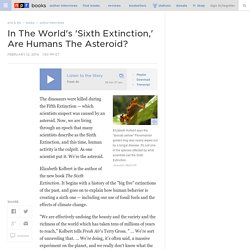
It's just one of the species affected by what scientists call the Sixth Extinction. Jacquelyn Martin/AP hide caption itoggle caption Jacquelyn Martin/AP Elizabeth Kolbert says the "taxicab yellow" Panamanian golden frog was nearly wiped out by a fungal disease. Humans on Verge of Causing 6th Great Mass Extinction. ‘The Sixth Extinction’ Looks at Human Impact on the Environment. Photo When Elizabeth Kolbert joined The New Yorker in 1999, after more than a decade covering New York politics as a reporter and columnist for The New York Times, she began gravitating to environmental issues.
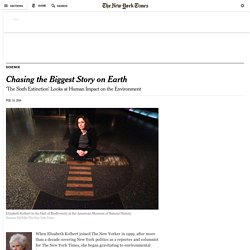
“The magazine has a history in this area,” she told me in one of two recent conversations. “They’d published Rachel Carson. It was unoccupied territory at the time.” This week Ms. What follows is an edited and condensed version of our conversations. Q. A. Continue reading the main story We Are the AsteroidUpdate RequiredTo play the media you will need to either update your browser to a recent version or update your Flash plugin. It’s not something we’re doing because our species is greedy or evil. When we use fossil fuels, we are reversing geological history by taking organisms that were buried millions of years ago and pumping their carbon back into the atmosphere at a very fast rate. Why do you say this could lead to an extinction event?
It’s not what I say. Holocene extinction. The dodo, a flightless bird of Mauritius, became extinct during the mid-late seventeenth century after humans destroyed the forests where the birds made their homes and introduced mammals that ate their eggs.
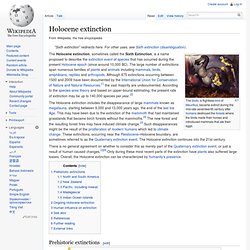
The Holocene extinction includes the disappearance of large mammals known as megafauna, starting between 9,000 and 13,000 years ago, the end of the last Ice Age. This may have been due to the extinction of the mammoth that had maintained grasslands that became birch forests without the mammoths.[3] The new forest and the resulting forest fires may have induced climate change.[3] Such disappearances might be the result of the proliferation of modern humans which led to climate change. These extinctions, occurring near the Pleistocene–Holocene boundary, are sometimes referred to as the Quaternary extinction event. The Holocene extinction continues into the 21st century. Extinction Symbol. We must hear — and heed — the nightingale’s warning. Ocean Life Faces Mass Extinction, Broad Study Says. “I see this as a call for action to close the gap between conservation on land and in the sea,” said Loren McClenachan of Colby College, who was not involved in the study.

There are clear signs already that humans are harming the oceans to a remarkable degree, the scientists found. Some ocean species are certainly overharvested, but even greater damage results from large-scale habitat loss, which is likely to accelerate as technology advances the human footprint, the scientists reported. Coral reefs, for example, have declined by 40 percent worldwide, partly as a result of climate-change-driven warming.
Some fish are migrating to cooler waters already. Black sea bass, once most common off the coast of Virginia, have moved up to New Jersey. #5: Stephen Hawking's Warning: Abandon Earth—Or Face Extinction. By Big Think Editors Let's face it: The planet is heating up, Earth's population is expanding at an exponential rate, and the the natural resources vital to our survival are running out faster than we can replace them with sustainable alternatives.
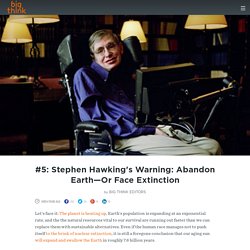
Even if the human race manages not to push itself to the brink of nuclear extinction, it is still a foregone conclusion that our aging sun will expand and swallow the Earth in roughly 7.6 billion years. So, according to famed theoretical physicist Stephen Hawking, it's time to free ourselves from Mother Earth. "I believe that the long-term future of the human race must be in space," Hawking tells Big Think. "It will be difficult enough to avoid disaster on planet Earth in the next hundred years, let alone the next thousand, or million. Hawking says he is an optimist, but his outlook for the future of man's existence is fairly bleak. Why We Should Reject This Idea More Resources — Stephen Hawking's homepage. — Dr. We're Underestimating the Risk of Human Extinction. Unthinkable as it may be, humanity, every last person, could someday be wiped from the face of the Earth.

We have learned to worry about asteroids and supervolcanoes, but the more-likely scenario, according to Nick Bostrom, a professor of philosophy at Oxford, is that we humans will destroy ourselves. Bostrom, who directs Oxford's Future of Humanity Institute, has argued over the course of several papers that human extinction risks are poorly understood and, worse still, severely underestimated by society. Some of these existential risks are fairly well known, especially the natural ones. But others are obscure or even exotic. Most worrying to Bostrom is the subset of existential risks that arise from human technology, a subset that he expects to grow in number and potency over the next century.
Humanity Is Getting Verrrrrrry Close to Extinction. Too late, Stop sign. via Flickr.

If you were to take a comparative look back at our planet during the 1950s from some sort of cosmic time-traveling orbiter cube, you would probably first notice that millions of pieces of space trash had disappeared from orbit. The moon would appear six and a half feet closer to Earth, and the continents of Europe and North America would be four feet closer together.
Possible Ways Humans Could Go Extinct In The Near Future. One day, there will come a time where humans will no longer walk the planet.

A morbid thought, I know, but a realistic one. We face extinction at some point and every day that we live we are just racing faster toward that inevitable end. Scientists have theorized about how it will happen and when it will happen and here is a compendium of some of the more likely theories. Humans are making computers stronger, faster, and more powerful every day. But when will it become too powerful? It seems like every single day there is a threat for Nuclear War from some country. How are humans going to become extinct? 24 April 2013Last updated at 05:42 ET By Sean Coughlan BBC News education correspondent Prepare to meet your maker: Will humans become extinct at our own hand?
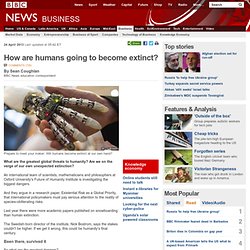
Voluntary Human Extinction Movement.